Garden Maintenance in Holborn
Introduction to Garden Maintenance in Holborn
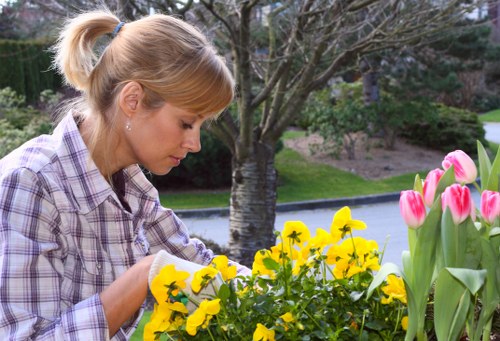
Maintaining a beautiful garden in Holborn requires a blend of expertise, dedication, and a deep understanding of the local climate and soil conditions. Whether you’re a seasoned gardener or a novice, proper garden maintenance ensures that your outdoor space remains vibrant and healthy throughout the year.
Holborn, with its unique urban environment, presents specific challenges and opportunities for garden enthusiasts. From limited space to diverse plant varieties, understanding the nuances of garden care in this area is essential for creating a thriving green oasis.
In this article, we will explore key aspects of garden maintenance in Holborn, providing you with actionable tips and insights to enhance your gardening experience.
Understanding the Local Climate
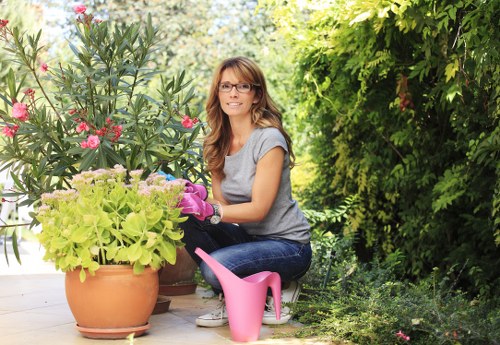
The climate in Holborn is characterized by mild winters and warm summers, making it suitable for a wide range of plants. However, unpredictable weather patterns can pose challenges. It’s crucial to select plant species that are resilient and can withstand occasional temperature fluctuations and varying rainfall levels.
Implementing effective irrigation systems and using mulch can help retain soil moisture during dry spells, ensuring that your plants receive consistent hydration. Additionally, understanding the seasonal changes will allow you to plan your garden maintenance activities more efficiently.
By aligning your gardening practices with the local climate, you can create a sustainable and low-maintenance garden that flourishes year-round.
Soil Health and Preparation
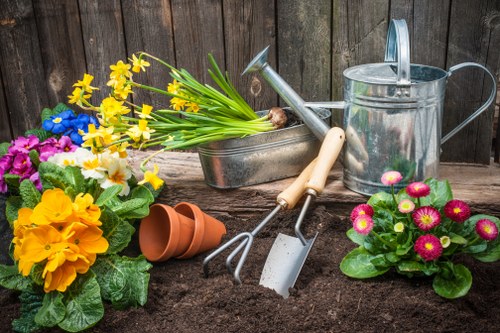
Healthy soil is the foundation of any successful garden. In Holborn, soil composition can vary, so it’s important to conduct a soil test to determine its pH level and nutrient content. Based on the results, you can amend the soil with organic matter, such as compost or manure, to enhance its fertility and structure.
Proper soil preparation involves loosening the soil to improve aeration and drainage. This creates an ideal environment for root development and helps prevent issues like waterlogging and soil compaction.
Regularly adding organic amendments and practicing crop rotation can further improve soil health, ensuring that your garden remains productive and resilient against pests and diseases.
Plant Selection and Care
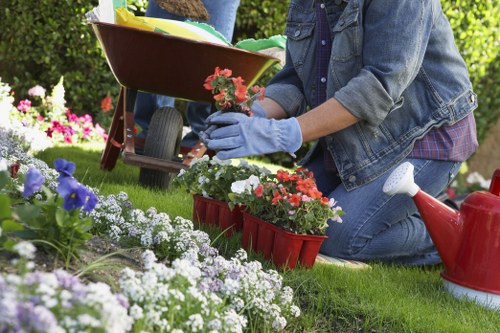
Choosing the right plants is crucial for garden maintenance in Holborn. Opt for varieties that are well-suited to the local climate and soil conditions. Native plants are often a good choice as they are adapted to the environment and require less maintenance.
Consider the growth habits, light requirements, and water needs of each plant. Grouping plants with similar needs together can make care routines more efficient and reduce the risk of over or under-watering.
Regular pruning, staking, and deadheading are essential practices to keep your plants healthy and encourage vigorous growth. Additionally, monitoring for signs of pests and diseases allows for timely intervention, preventing minor issues from escalating.
Landscaping and Design Tips
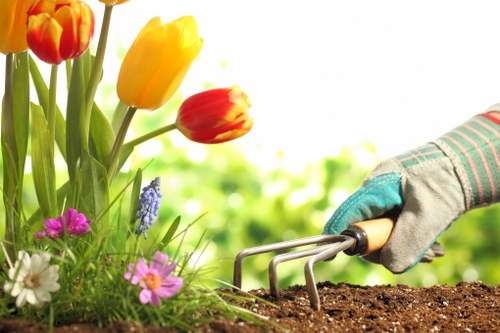
Effective landscaping can transform your garden into a harmonious and aesthetically pleasing space. Incorporate a variety of textures, colors, and plant heights to add visual interest and depth.
Using hardscape elements like pathways, patios, and garden furniture can enhance the functionality and appeal of your garden. These features provide structure and create designated areas for relaxation and entertainment.
Don’t forget to include sustainable practices in your design, such as rainwater harvesting, composting, and the use of native plants. These initiatives not only benefit the environment but also contribute to a healthier and more resilient garden.
Seasonal Maintenance Tasks
- Spring: Prepare beds, plant new annuals, and apply fertilizers.
- Summer: Regular watering, weeding, and pest control.
- Autumn: Clean up fallen leaves, mulch beds, and plant perennials.
- Winter: Protect plants from frost, prune dormant trees, and plan for the upcoming gardening season.
Adhering to a seasonal maintenance schedule ensures that your garden remains well-tended and that plants receive the care they need at the right times.
Implementing these tasks systematically can prevent common gardening issues and promote a healthy, thriving garden in Holborn.
Tools and Equipment for Effective Garden Maintenance
Essential Tools

Having the right tools is essential for efficient garden maintenance. Invest in quality tools such as:
- Pruning Shears: For trimming and shaping plants.
- Garden Fork: To aerate and loosen soil.
- Watering Can or Hose: For consistent plant hydration.
- Rake: To clear leaves and debris.
- Gloves: To protect your hands while working.
Advanced Equipment
For larger gardens, consider investing in advanced equipment such as lawn mowers, hedge trimmers, and irrigation systems. These tools can save time and effort, allowing you to focus on more detailed aspects of garden care.
Regular maintenance of your tools ensures their longevity and effectiveness, contributing to a smooth and productive gardening experience.
Pest and Disease Management

Protecting your garden from pests and diseases is a critical aspect of maintenance. Implement integrated pest management (IPM) strategies to minimize harm to beneficial insects and the environment.
Regularly inspect plants for signs of infestation or disease, and take prompt action to address issues. Use organic treatments and natural remedies whenever possible to maintain a healthy and eco-friendly garden.
Promoting plant diversity and maintaining healthy soil can also reduce the likelihood of pest and disease problems, ensuring a robust and resilient garden in Holborn.
Mulching and Fertilization

Mulching is a valuable practice in garden maintenance, providing numerous benefits such as moisture retention, temperature regulation, and weed suppression. Apply a layer of organic mulch around your plants to enhance soil health and reduce the need for frequent watering.
Fertilization provides essential nutrients that support plant growth and development. Choose the appropriate fertilizer based on your soil test results and the specific needs of your plants.
Balancing mulching and fertilization ensures that your garden remains vigorous and productive, sustaining plant health throughout the growing season.
Pruning and Trimming Techniques

Regular pruning and trimming are essential for maintaining the shape and health of your plants. Remove dead or diseased branches to prevent the spread of infections and encourage new growth.
Proper pruning techniques vary depending on the plant species, so it’s important to research and follow best practices for each type of plant in your garden.
Consistent pruning helps plants develop strong structures, enhances flowering and fruiting, and maintains an attractive appearance in your Holborn garden.
Watering Strategies for Optimal Plant Health
Efficient Watering Techniques

Effective watering is crucial for plant survival and growth. Employ efficient watering techniques such as drip irrigation or soaker hoses to deliver water directly to the root zone, minimizing evaporation and wastage.
Avoid overwatering, which can lead to root rot and other plant diseases. Instead, aim for deep, infrequent watering sessions that encourage deep root growth and drought resilience.
Rainwater Harvesting
Consider implementing rainwater harvesting systems to collect and store rainwater for garden use. This sustainable practice reduces reliance on municipal water sources and provides your plants with natural, chemical-free hydration.
Integrating rain barrels or cisterns into your garden design can enhance water conservation efforts and contribute to a greener, more eco-friendly garden in Holborn.
Seasonal Planting and Rotation

Strategic seasonal planting and crop rotation are key components of effective garden maintenance. Planting seasonally ensures that your garden remains productive and that plants thrive during their optimal growth periods.
Crop rotation helps prevent soil depletion and reduces the risk of pest and disease buildup, promoting long-term soil health and productivity.
By carefully planning your planting schedule and rotating plant families, you can maintain a balanced and sustainable garden ecosystem in Holborn.
Composting and Organic Practices
Benefits of Composting

Composting is an eco-friendly practice that recycles organic waste into nutrient-rich soil amendments. It reduces landfill waste and provides your garden with a sustainable source of nutrients.
By maintaining a compost pile or bin, you can create a continuous supply of compost that enhances soil structure, fertility, and microbial activity.
How to Start Composting
Begin by collecting kitchen scraps, yard waste, and other organic materials. Ensure a balanced mix of green and brown materials to facilitate effective decomposition.
Regularly turning the compost and maintaining proper moisture levels accelerates the breakdown process, resulting in rich compost that supports healthy plant growth.
Garden Maintenance Schedule

Establishing a garden maintenance schedule helps you stay organized and ensures that essential tasks are completed in a timely manner. Here is a sample monthly schedule:
- **January:** Plan your garden layout and order seeds for spring planting.
- **February:** Start indoor seedlings and prepare garden beds.
- **March:** Begin planting hardy vegetables and perennials.
- **April:** Continue planting, prune spring-flowering shrubs.
- **May:** Monitor for pests, apply mulch, and fertilize as needed.
- **June:** Maintain irrigation systems and prune summer-flowering plants.
- **July:** Harvest early crops, deadhead flowers, and manage weeds.
- **August:** Prepare for fall planting and continue regular maintenance.
- **September:** Plant autumn flowers and vegetables, begin composting.
- **October:** Clean up garden beds, mulch for winter, and prune as necessary.
- **November:** Protect plants from frost, store tools, and plan for next year.
- **December:** Review the past gardening season and make adjustments for improvement.
Adhering to a structured maintenance schedule ensures that all aspects of your garden receive the attention they need, fostering a healthy and flourishing outdoor space.
Contact us today to learn more about effective garden maintenance strategies tailored to Holborn’s unique environment.